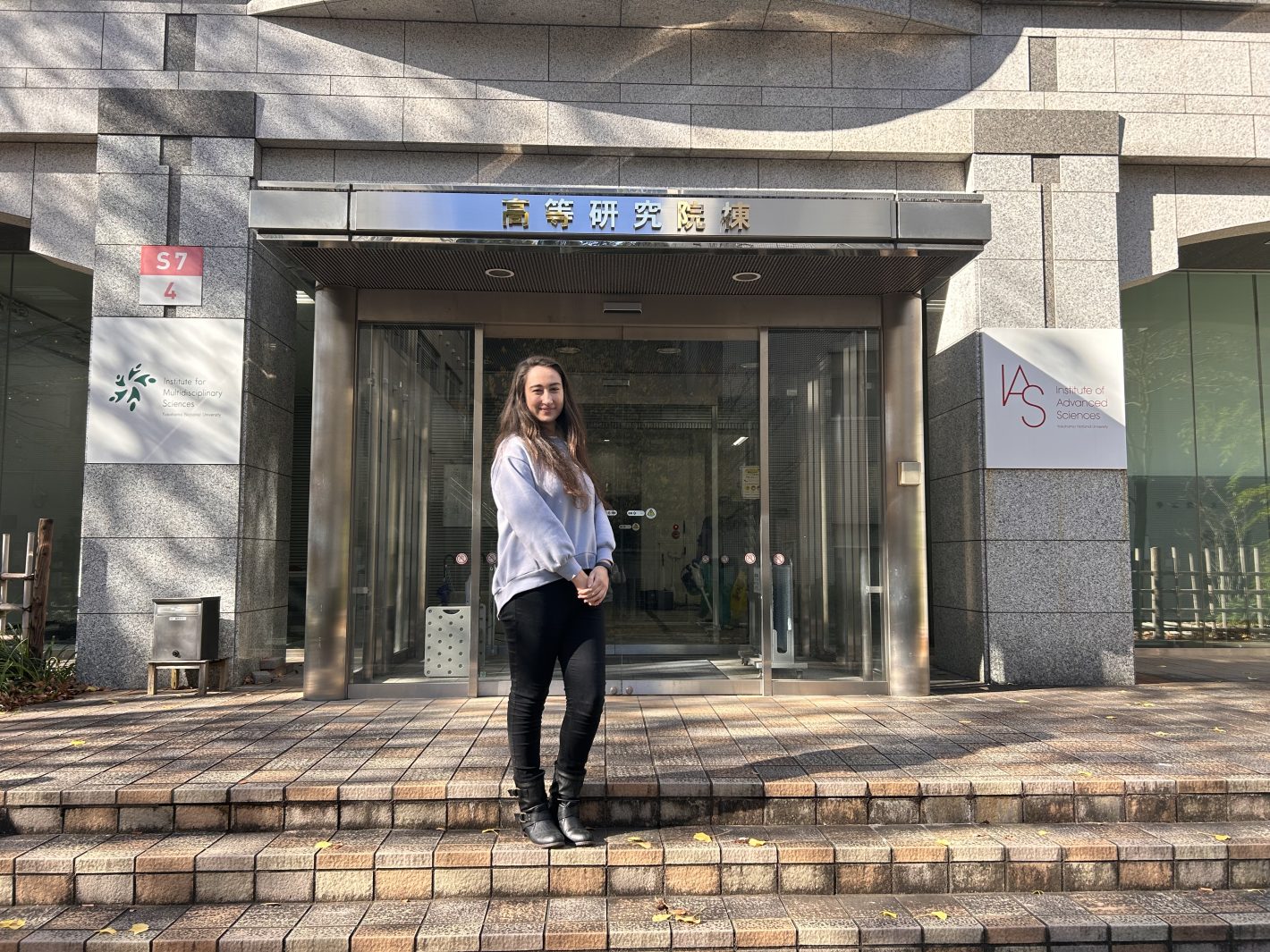Lieze Schindler, IAS Assistant Professor
Researcher’s Profile
・Lieze Schindler, IAS Assistant Professor at Quantum Control Electronic Integrated Circuit Laboratory
・Research Interest : Super-conductivity, layout optimization, cell design

Lieze Schindler majored in electronic engineering from her undergraduate to her doctoral course studies at South Africa’s Stellenbosch University (SU).
After obtaining her PhD in 2020 from SU, Schindler worked there for one year as a research engineer before taking up her post as an assistant professor at YNU’s IAS Quantum Control Electonic Integrated Circuit Lab, Qantum Information Research Center (QIC).
Schindler began studying superconducting circuits while at graduate school; this struck her as a challenging and interesting field, and she decided to study for a PhD in that field. She chose to conduct research at YNU primarily because of the university’s cutting-edge research facilities. An additional reason was that Professor Nobuyuki Yoshikawa invited her husband, who specializes in the same field, to IAS as well. While studying for her PhD, Schindler had conducted joint research with Professor Yoshikawa’s team and had traveled to Japan in 2017 and 2019. After completing her PhD course, Professor Yoshikawa invited her to IAS but she hesitated, saying that although she was interested in the field, she did not want to be separated from her husband. Given the circumstances, Professor Yoshikawa offered her husband a chance to come to Japan as a researcher as well, and as a result, they came to Japan together.
Schindler is currently taking full advantage of YNU’s cutting-edge research facilities and hopes that her research will yield fruitful results. She also wishes to contribute to educating future young engineers, particularly in the field of superconductivity.
Please describe your current research
In my research, I am concentrating on developing a better understanding of how superconducting circuits function in actual application. Specifically, I am researching how the earth’s magnetic field impacts superconducting circuits and looking for practical solutions for minimizing magnetic field impact.
What do you think about the research environment and the atmosphere at IAS?
IAS has the most up-to-date research facilities, particularly its test chamber. In South Africa, there was very little budget allocated to a basic test chamber and test chamber equipment, so all I could do was conduct simulations to verify my work. To manufacture and test superconducting circuits, I had to send my designs to the United States and delegate the work to them. In most cases, though, that did not go smoothly, the causes of the problems remained unknown, and it was very difficult to understand the technology in real terms. At YNU, on the other hand, there is an excellent test chamber, and I can manufacture and test circuits myself. That practical approach has really helped me understand my research.
At YNU, there are also many opportunities here to have scholarly exchanges. In my experience, researchers in South Africa, the United States and other countries tend not to want to share the content of their research with others, and as a result, there is a lot of duplication of the same research by multiple researchers. I found that very disappointing, Meanwhile, the culture of Professor Yoshikawa’s lab is to share knowledge. There are monthly Zoom meetings with researchers at Nagoya University, Kyoto University and other institutions, where researchers share information about the research they are doing. In that kind of environment, there is little risk that another researcher will appropriate your ideas and publish a paper first; in fact, that atmosphere is more conducive to participants providing useful ideas for each other’s research. There are also many academic conferences in Japan and a lot of scholarly activity. In South Africa, I only had a chance to attend academic conferences once a year, but in Japan such conferences take place three or four times a year. I also have academic meetings with Professor Yoshikawa twice a month, giving me an opportunity to hear valuable academic opinions on a one-on-one basis.
Lastly, as IAS is an international research center, I have had many opportunities to interact with other foreign researchers here, and I am able to work together with them, build relationships and carry out joint research with people from all over the world.

Out of a perfect score of 100, how would you rate your life so far?
I don’t think it’s possible to assign my life a score. I am tough with myself, and I think I would not evaluate myself very highly, probably giving myself a score of around 50. There are just so many things that I want to accomplish and dreams that I want to follow. If I were sitting next to me as a child now, I would say “Go with your gut, do what your intuition tells you!” Why would I say that? Because I’m personally not that much of a planner; if you plan too much, more than half of what you planned will not go so as you had expected. On the other hand, so far, I’ve been following what my instinct tells me is the right direction, and I’ve gotten amazing results.
What are your future career and life goals?
The future is unpredictable, so I don’t like setting goals like that. As far as the near future is concerned, though, I’m planning to return to South Africa and work as a research engineer with my previous research group. That group also has a company, and I want to help with managing and operating the company, along with my research. I’m not sure yet if I want to become a university professor, but I’m considering that as one option. For the time being, I’ll return to South Africa and my research group, and work on establishing the company. In the future, if I have my own research lab at a university, I’d like to set up an exchange student program and create lots of opportunities for Japanese students to come and study in South Africa.
What kind of special experiences have you had in Japan?
In 2022, I had a chance to attend the F1 Grand Prix race in Japan. Ever since I enjoyed a simulated driving experience at the Ferrarri Museum in Italy, I got interested in racing cars, but I didn’t expect that I would have the experience of attending an actual race here in Japan.
I also really enjoyed seeing a rugby match in Yokohama. Yokohama’s rugby team was participating in the Japan Rugby League One competition, and the team members included many players from South Africa. I was happy to cheer for them and their superb play.
I also went to a ryokan in the mountains when it was snowing, which was my first experience with snow. Other special experiences were rafting on the Yoshino River and traveling in Shikoku during sakura cherry blossom season.
-1069x1420.jpg)
Compared to before coming to Japan, how do you feel you have changed since?
I feel I have developed a stronger sense of responsibility. During my PhD course and my job as a research engineer, I was always the youngest person in my research group, and it wasn’t necessary for me to be too concerned about the progress of the research. But at YNU now, I am the research leader, and I need to communicate with other members and I’m responsible for systematically managing research and meetings.
Another change is that my anxiety about socializing has lessened. I’m a natural introvert, and I used to find it difficult to communicate with other people. But Japanese society respects personal privacy, and it’s common for many people to not be so sociable. That kind of environment has been very relaxing for me. I don’t feel that I have changed in terms of sociability, but I don’t find it stressful any more to talk to other people.
My thoughts about what’s necessary in life have also changed. Before coming to Japan, I aimed to buy a large house. It wasn’t something really essential; I simply wanted to buy a large house. But since coming to Japan, I’ve been living in a small apartment, which made me realize I don’t need a big house. In fact, living in a smaller place allows for saving money to travel, etc., so I feel that the Japanese lifestyle has had an impact on me.

